
views
X
Research source
Admitting that you hold internal biases can be hard, but you’re not alone. Additionally, by changing yourself for the better, you can create real change in the world.
Addressing Harmful Speech

Ask your friends to call you out when you make racist comments. You might not realize that you’re being insensitive, especially if you grew up around people who made racist comments often. It’s good that you’re trying to overcome that behavior, and it’s okay to ask for help. Talk to your friends about your desire to change and ask them to point out harmful speech if it happens again. You might say, “I admire how open and accepting you are. I want to be like that, too, so can you tell me if I say something insensitive?” or “I know you’ve called me out for saying racist comments in the past. I’m still learning how to spot them, so can you tell me if I say something inappropriate?”

Listen when someone tells you your comment is racist. You may get called out for saying something offensive when you didn’t mean any harm. You might feel embarrassed and even a little hurt that someone would accuse you of being racist, but it’s important to listen when people of other races and cultures tell you something bothers them. Believe them when they tell you you’re being offensive. Consider taking notes when someone calls you out for saying something offensive. Write down what you said, why, and the circumstances surrounding it. This may help you figure out the problem with what you said. If the person feels comfortable explaining why they’re hurt, be open to listening. However, it’s not their responsibility to educate you about racial issues. Be willing to do the work to learn for yourself.

Recognize that intent doesn’t matter. Being called out for racism can be super frustrating, especially if you think of yourself as someone who promotes equality. It’s understandable that you’d want to defend yourself and refuse to admit you said anything wrong. However, it doesn’t matter that you didn’t mean to hurt anyone. Be willing to see things from someone else’s point-of-view. For example, you might say something like, “You speak English really well for someone who was born in Mexico.” You might mean this as a compliment, but the person you’re talking to may see it as very offensive.

Apologize to everyone who heard your comments. While apologizing won’t erase what you said, it shows others you recognize that you said something wrong and feel bad about it. Give your apology immediately after you make a comment or as soon as possible. Don’t make excuses for what you said, as this undermines the apology. Just admit you were wrong and offer to make it up to them. Say something like “I realize how insensitive my words were. I apologize and I hope you will allow me to make amends.” Or, you might send an email or letter at a later date. Say something along the lines of “I spoke harshly about you last week. I apologize. My relationship with you is important to me. What can I do to make this better?”
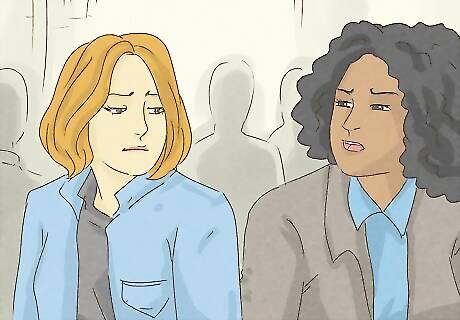
Speak up if you hear other people making racist comments. You can help yourself and others change their attitudes about different racial groups by speaking out. When you hear a friend or relative make a racially-charged comment, don't laugh or ignore the remark. Pull them aside and ask them questions about what they said. Try to help them understand why they shouldn’t make these types of comments. You might say, “What did you mean by that?” or “How would you feel if someone said that about you?”
Eliminating Racist Posts Online
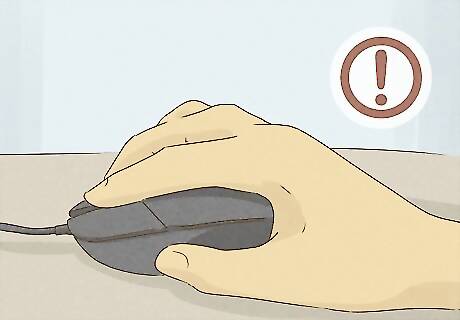
Be careful about what you post online. Online comments can cause a lot of community harm for people who are targets of these posts. Make sure your posts don't contain anything that might be perceived as racist. Additionally, think twice about sharing memes, jokes, commentary, or art that might be offensive. For example, let's say you see a joke about Black single moms. This is likely offensive, so don't share it. If you’re not sure if a post might be racist, it’s probably best that you don’t post it. If you don't understand an issue, do some research before you post about it. As an example, you might have seen posts about why Black women are upset about workplace hair rules. If you don't know that they've been discriminated against in the past, you might accidentally share an uninformed and offensive post. Remember that your intent doesn’t matter. If someone thinks your post is racist and gets offended, believe them.

Imagine how others may react to material you share before clicking post. It can be hard to see things from someone else’s perspective, but do your best to put yourself in other people’s shoes. If you think someone might be hurt by your words, keep them to yourself. For example, let’s say you come across a meme you think is funny, but it targets another race. Think about how someone who’s a member of that race might feel reading it.

Share posts that promote anti-racist views. Spread positive messages instead of hate because you might be able to make a difference. Being anti-racist means taking action to confront and overcome racism. At first, re-post content from organizations and activists who are working to eliminate racism. As you educate yourself about racial disparities and systemic racism, create your own original content to help raise awareness and create change. As an example, you might share articles about police brutality and unequal incarceration of Black Americans. You might also post infographics or videos that provide an overview of historical racial injustices.
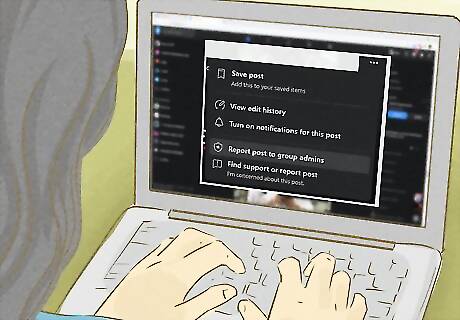
Report racist posts when you see them. Unfortunately, racism remains rampant on the internet. However, you can make a difference and help create change. When you see offensive content, report it to the site administrators so they can hopefully take it down. Most sites allow you to report content anonymously.
Confronting Racial Biases

Identify biases within yourself. Like most people, you’ve probably learned biases over the course of your life. Your beliefs are shaped by society, so it’s easy to internalize harmful stereotypes and beliefs. Examine your own beliefs to identify potential biases you may have. This will help you change these ideas so you no longer make racist comments. For example, clutching your bag when you pass a Black man is a sign of a prejudicial belief that they might be more likely to steal from you, which is untrue. You might take an online quiz to help you identify your biases. You can find one here: http://www.tolerance.org/Hidden-bias
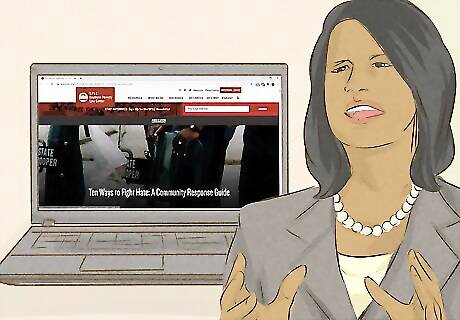
Educate yourself about racial injustice. If you’ve never experienced racial injustice, you may have a lot of trouble understanding it. However, you can't help create positive change if you stay in the dark. Read books and articles about racial issues, and watch documentaries, as well. Additionally, follow activists and consume what they have to say. Consider a wide array of points-of-view so you get a well-rounded picture. Challenge what you’ve been taught about racial issues in your past. Don’t assume that you already know the whole story.
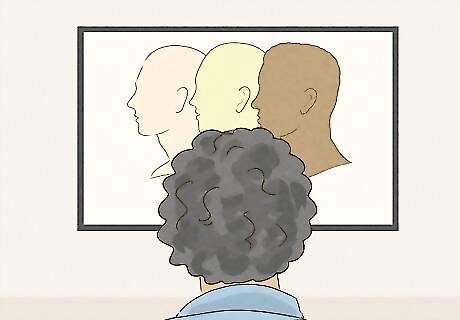
Learn about other races and cultures. Biases are often ingrained and learned at an early age. These stereotypes and prejudices can be unlearned by consciously being aware of them and educating yourself. Open your mind to different ideas and cultures. Read books by authors who are Black, indigenous, or people of color. Watch movies and TV shows about characters who are a different race or culture from you. Explore other cultures through art, food, and museums.

Develop empathy for people of color by seeing their perspective. You probably don’t want to hurt anyone’s feelings, but it may be difficult to understand their perspective. Do your best to see the world through someone else’s eyes. Consider how you would feel if you were in their place. Use this to help you spur change in your own beliefs and how you talk to others. Consider how you would feel if racist comments, jokes, or memes were directed at you. Imagine going through the events you learned about in your studies about racial injustice and other cultures.

Connect with people from other groups. One of the best ways to overcome racist viewpoints is to make friends from different racial groups. This way you can challenge those ingrained prejudices and biases in real life. Meeting people from different backgrounds helps you maintain perspective and expand your worldview. Attend cultural celebrations that are open to the public. Talk to people to learn and possibly make friends. Go to local events, take classes, or join a club to meet more people. Push yourself to talk to people who are from a different race or culture.




















Comments
0 comment